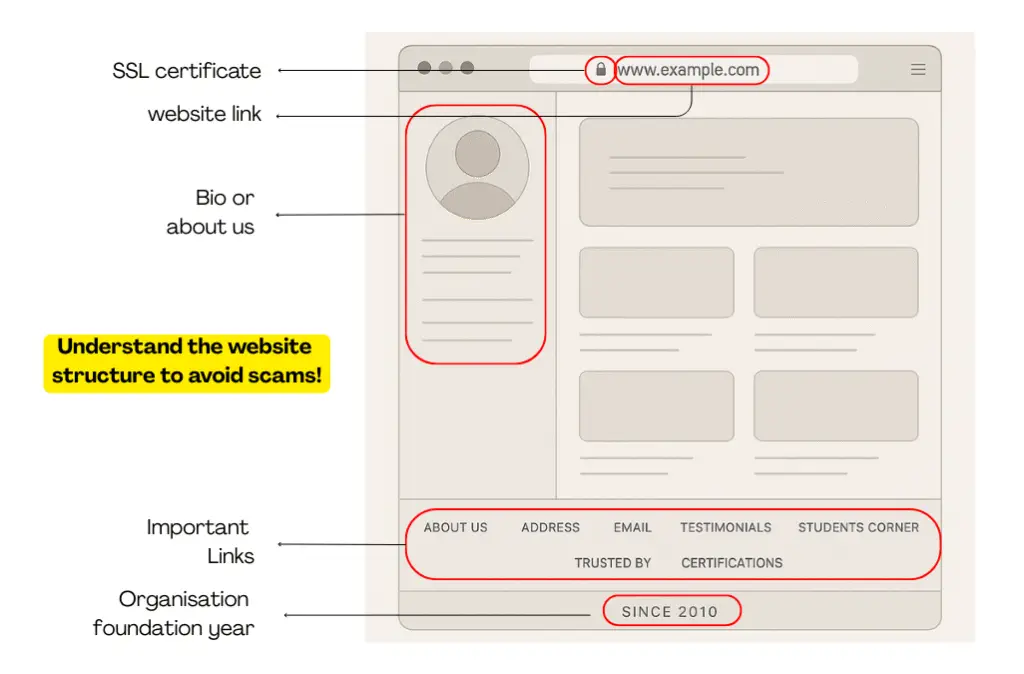As you all know, I’ve been in an online space for more than 10 years. My entire business is on the Internet. Let me tell you, it is the most vulnerable place to be scammed. Even though everyone knows that, they still get scammed.
It’s not only about bank or money scams. Students and researchers are trapped, too. Want to know how? Here is a complete guide on various types of biological and life sciences student and researcher scams, and how to avoid them.
Stay tuned.
Related article: 5 Best Platforms for Science Graduates to Start Freelancing and Earn.
Key Topics:
List of common online student and researcher scams:
Here I am explaining how students and researchers get scammed online.
Part-time or freelance work:
One of the most common forms of fraud is part-time jobs and freelance work. Students often think of earning ‘some’ money while studying or doing research, but end up in a scam.
Scammers do multiple types of scams, ask for registration fees, bank details or other personal information. Oftentimes, they ask for OTP and students even give them. And that’s it!
You are scammed!
What to do now?
Focus on your education or research, that’s it, you will have many opportunities later on. If you still want a part-time job or freelancing work, check the organization’s details that proposed the job, check the website, their social media handles and address, if given.
Verify their identity and then proceed.
Trivia:
Don’t pay or give registration fees to get a job or work. In 99% cases, it’s just a trap
Fake jobs and internships:
Scammers are one step ahead of us. Akshay Kumar’s popular movie ‘Special 26’ is real! They hire you online, join you in a conference or one-to-one, motivate you, give you some tasks and then scam you.
Such scams look real, from form-filling to one-on-one to training, you don’t even realise when the scam has been executed. They even know that life science students and researchers are looking for skill improvement and internships, and they run internship scams, as well.
You often see, ‘seats are filling fast…’ in a rush, you fill the form, pay money and the scam is done!
What you can do is check the company’s profile and again, their details, social media handles, their address, and their real business. Renowned organisations never ask to ‘hurry up, seats are filling and register now!’ Those are mostly scams. If their seats are already filled, they close the registrations.
Related article: 10 High-Paying Freelance Opportunities In Genetics [No Lab Work Needed].
Trivia:
Companies or organizations doing well have a substantial SEO credit online; do check it.
Predator journals and conferences:
Master’s, dissertation or PhD students are new to the research world. In the beginning, they do not have knowledge of journals, publishing guidelines and related things. Thus, get scammed here.
The internet is full of fake and mirror journals. And that’s true for international conferences as well. Students and researchers are easily trapped in the free accommodation, certification, etc, like offerings. Fill the form and pay the registration fees.
These actually end up as a scam. What you can do is take an expert’s guidance for choosing and publishing your research. Check the journal indexing status – SCOPUS, Web of Science, DOAJ, etc.
For conferences, check their previous conferences, students’ experiences, testimonials, their scientific panel, the organizing body, etc.
Fake online courses and certifications:
Nowadays, the Internet is full of various silly courses. It’s hard to tell if a course is a scam, legit or useful. Because if it has content, thin or in-depth, it is content! We can’t say if it’s fake or not!
However, you can use our guide on how to choose a genetic course online. And check out these points.
- Check if the course is on a legitimate platform.
- Check if the course presenter is highly educated or not. Meaning, whether he or she has sufficient expertise and experience for the course or not.
- Check the course content and duration.
- Check course affiliation, if any.
- Check the testimonials (optionals – aren’t trustworthy).
In addition, certification is valid and legitimate only if given by a well-established affiliation or university.
Research grant and scholarships:
Again, the scamming pattern is almost similar to the job and conference scams. They make a temporary website, post the grant or scholarship, send you an email and ask for registration.
The solution, we already discussed. Check the authenticity of the organization. Their organization’s details, past research or scholarship and their organization or other information.
Subscription and membership:
Every emerging scientist and student wants to become a member of prestigious societies like the American Society of Human Genetics or the European Cytogenetic Association.
Scammers use mirror sites and hunt students and novice scientists, charge thousands of dollars and scam them.
Related article: Why Your Wet Lab Skills May No Longer Be Relevant After 2025.
Phishing and data theft:
Phishing is also common among students and researchers. When you submit any research paper, or apply for society membership or anything, they send you a scam email for verification or payment.
And you will be trapped in phishing. This is the most common way. They can also steal your data, patent or other intellectual property.
How to Avoid Online Scams?

- Check the SSL certification, the lock symbol at the top of the website (in the Google search bar). This shows that the website is safe to visit.
- Check the website link; it should have a top-level domain ending with .com, .co, .edu, .co.in, .au, etc.
- Check the organization’s details- their address (physical), social media handles (engagements too), and governing body or team.
- Check important pages in the footer of the website – about us, testimonials, address, email, students’ corner, affiliations, certifications, etc.
- Check if they mentioned their founding year, at the bottom of the footer- like ‘all right reserved since 2010’ or simply ‘since 2010.’
- Check the website sidebar, if any, if they showed the organization’s or author’s details or not.
- Most importantly, check if they communicate with the official email or not. For instance, if we communicate, the email address is” [email protected] or [email protected].
- Don’t directly click any link.
Wrapping up:
Thousands of students and researchers every year are trapped in scams. Scammers become smarter every day. They know we are not technical and don’t know the technicalities of the Internet.
But they are wrong! Scientists at Genetic Education aren’t only doing research or writing content, we are experienced in an online business, and we find phishing, traps and scams.
This is just a small piece of content; we will do a live class on this and explore the topic in detail. Till then, subscribe to Genetic Education.


